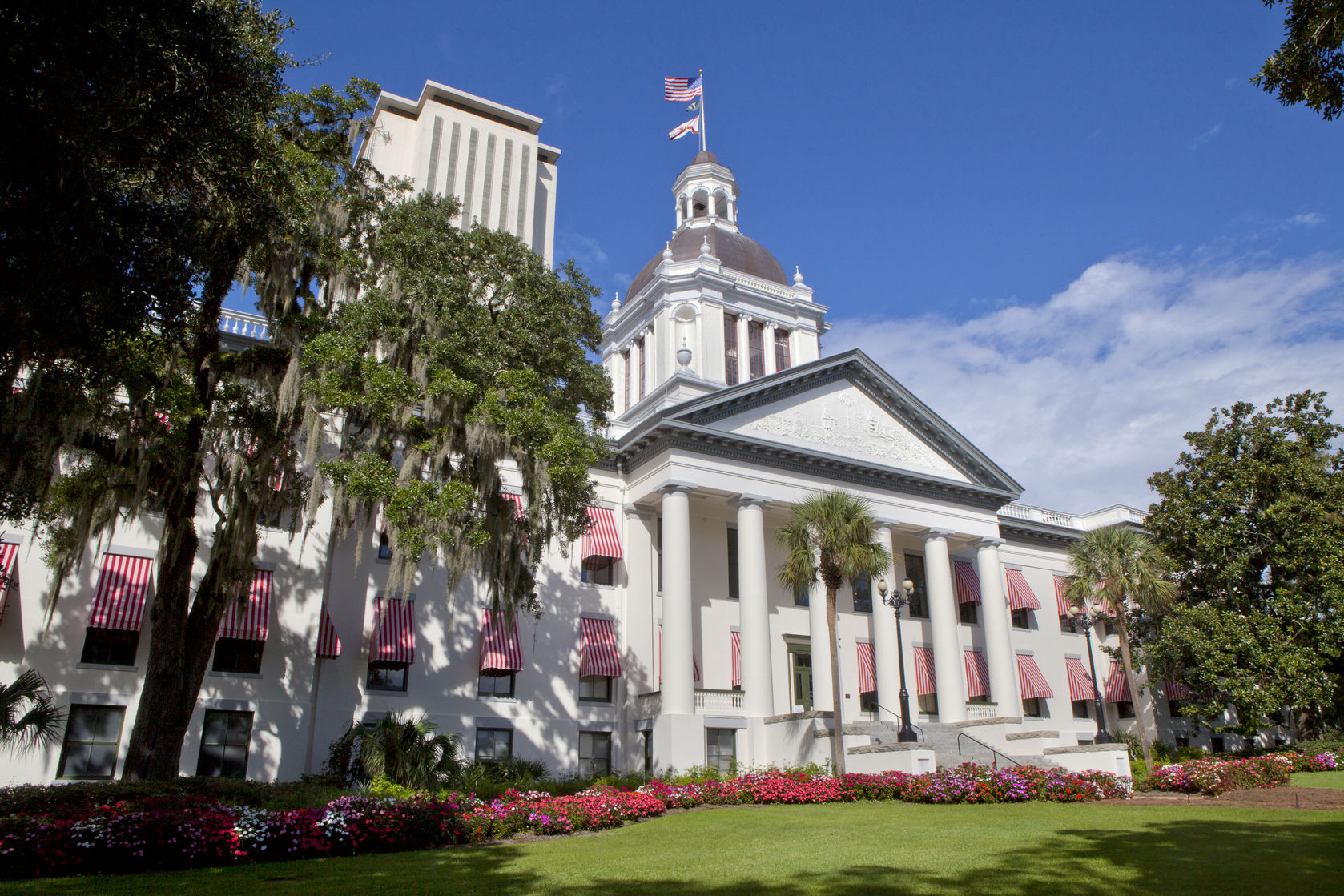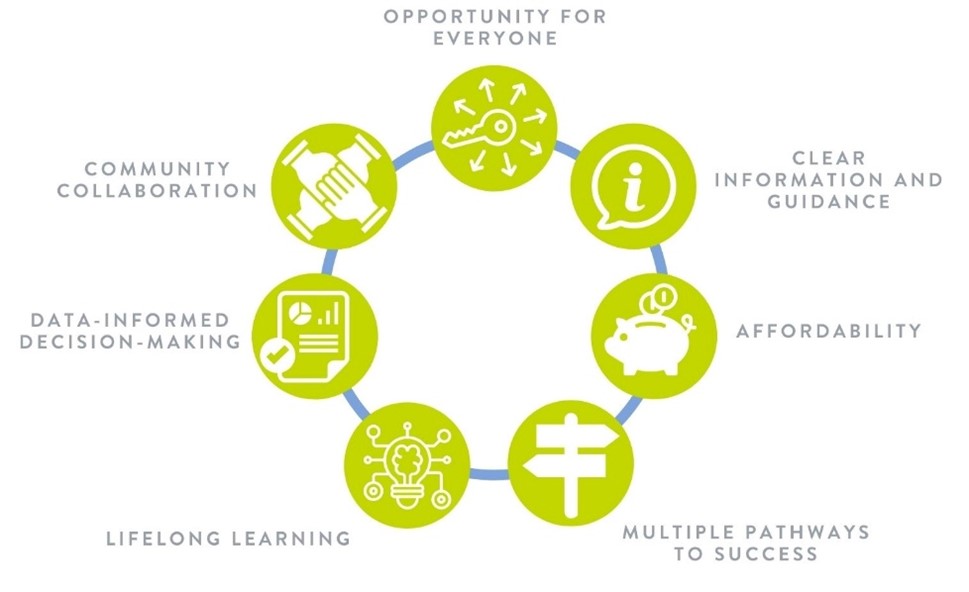Introduction
The 2022 Florida Legislative Session is scheduled to begin on January 11 – an early start due to it being an election year, with redistricting taking a front seat for both chambers. After last session’s sweeping overhaul of Florida’s previous workforce education systems, spearheaded by House Speaker Chris Sprowls (R – Clearwater), this year’s legislative agenda will partially focus on further strengthening these policies to benefit Floridians.
Many of the proposals before the legislature in the next 60 days will impact that state’s path to achieving a Talent Strong Florida. With over 2,500 bills filed between both chambers for the 2022 Legislative Session, which are the leading policy initiatives poised to impact postsecondary access and attainment for Florida students?
This preview includes some of the top budget priorities and legislative proposals to watch this session. All legislation will be categorized with the following icons to connect the proposed policy with FCAN’s 7 Conditions for Success.
- SB 400/HB 229 — Guidance Services for Academic and Career Planning
- SB 514/HB 317 — Workforce Education Requirements
- SB 698/HB 979 — Standard High School Diploma Award Requirements
- SB 722 — Education for Student Inmates
- SB 764/ HB 757 —Step Into Success Internship Program
- SB 1060/ HB 461 — Florida Bright Futures Scholarship Program Student Service Requirements
- SB 1068/ HB 155 — Certificates of Completion
- SB 1512 — Summer Youth Service Learning Program
Budget
According to the Florida Office of Economic and Demographic Research, Florida’s economic forecast shows continued recovery from the COVID-19 pandemic with a +0.5% percent increase in GDP for the 2020-2021 fiscal year (FY). Furthermore, the latest economic estimating conference predicts additional growth for the 2021-22 FY with a projected GDP increase of +2.0%.
Governor Ron DeSantis’ recommended budget for the 2022-2023 Fiscal Year—Freedom First—outlines his priorities for the coming year with a breakthrough $99.7 billion in funding, with $15.3 billion in total reserves. This budget shows a $3.1 billion increase from last year’s recommended budget, with $36.3 billion from federal funds.
The Governor continues to support his goal outlined in Executive Order 19-31—Charting a Course for Florida to Become Number 1 in the Nation for Workforce Education by 2030 and Ensuring Florida Students are Prepared for the Jobs of the Future —by continuing to fund programs that promote credential completion, student retention, and career and technical education (CTE). The budget allocates $27.7 billion for education, including $1.3 billion in state operating funds for the Florida College System (FCS) and $2.7 billion for the State University System (SUS). The proposed budget maintains funding for the Pathways to Career Opportunities Grant Program ($15 million), Performance-Based Incentives for CTE students at school district technical centers and Florida Colleges ($20.5 million), and performance funding for the Florida College System ($25 million) and State University System ($560 million).
The Governor recommends that workforce programs continue to be funded with over $534 million to ensure students are acquiring the necessary skills and credentials to fill high-demand, high-wage jobs to meet the needs of our rapidly changing economy. These funds include $100 million for the new workforce development capitalization incentive, used for instructional equipment and supplies to support program development.
Additionally, the Governor’s recommended budget maintains $20.8 million for the Florida Postsecondary Academic Library Network that provides essential library and virtual learning resources to the state’s public colleges and universities. The Freedom First budget also marks the return of the Bright Futures textbook stipend ($300 stipend for fall and spring, $40 million total), which the Legislature previously cut for FY 2021-22. As in last year’s budget recommendations, there are no increases in tuition and fees at Florida’s colleges and universities, allowing Florida to remain one of the states with the lowest tuition rates in the country.
Policy
SB 400/HB 229 – Guidance Services for Academic and Career Planning
Bill Sponsors: Senator Randolph Bracy (D – Orlando) and Representative Kristen Arrington (D – Osceola)
Senate Bill 400 and House Bill 229 amend the current requirements district school boards have for academic and career planning for students. Under this bill, students and their parents would be notified about career and professional pathways and work-based learning opportunities and receive contact information for guidance counselors who can further advise students on these options. This information would be provided at the beginning of every school year, in addition to current requirements to discuss advanced placement (AP) and dual enrollment courses.
Both versions of the bill consider that this information must be disseminated to parents and families in a culturally competent manner by providing it in a language that is understandable to all parties.

SB 514/HB 317 – Workforce Education Requirements
Bill Sponsors: Senator Danny Burgess (R – Zephyrhills) and Representative Nick DiCeglie (R – Largo)
Senate Bill 514 and House Bill 317 further expand workforce education opportunities in Florida. If passed, these bills would allow a public sector employer to substitute a candidate’s related work experience for postsecondary educational requirements otherwise set in the hiring notice. If the employer decides to hire new talent in this manner, they must provide this notice of substitution on all job postings and advertisements.
An applicant cannot use work experience to substitute for a required license, certification, or registration.

SB 698/HB 979 – Standard High School Diploma Award Requirements
Bill Sponsors: Senator Janet Cruz (D – Tampa) and Representative Dan Daley (D – Sunrise)
Beginning with incoming students in the 9th grade during the 2023-24 school year, Senate Bill 698 makes the completion of the Free Application for Federal Student Aid (FAFSA) a requirement to earn a standard high school diploma. This bill provides conditions for students or parents to exempt themselves from the requirement. In order to opt-out, parents (or the student if they are 18) must submit a letter to the school district declining FAFSA completion.th
House Bill 979 is similar to SB 698 but if passed, would go into effect with incoming students during the 2022-2023 school year and opt-out letters must be submitted to the school, rather than the school district.

SB 722 – Education for Student Inmates
Bill Sponsor: Senator Keith Perry (R – Gainesville)
This legislation would authorize the Department of Corrections (DOC) to partner with any Florida College System (FCS) institution to provide educational, career, or vocational training services to inmates in the Correctional Education Program.

SB 764/HB 757 – Step Into Success Internship Program
Bill Sponsors: Senator Ben Albritton (R – Bartow) and Representative Spencer Roach (R – Fort Myers)
Senate Bill 764 and House Bill 757 create the “Step Into Success Internship Program” for foster youth (older than 16 but younger than 26) within the Department of Children and Families (DCF). Program participants would receive hands-on training and develop essential workforce skills to further their career paths and transition to independent living.
DCF will have various responsibilities to ensure the internship program is established and able to begin operating on or before January 1, 2023. These responsibilities include preparing an educational toolkit with relevant information and resources, properly advertising the internship program to all eligible foster youth, and providing these individuals with a minimum of two hours of interview training. Eligible foster youth would receive priority consideration for positions across seven government agencies, including the Department of Health (DOH) and Department of Education (DOE).
DCF will work with DOE, the Board of Governors (BOG), and the Independent Colleges and Universities of Florida (ICUF) to create a system to award college credit towards a degree for individuals who participate in this internship program.
The proposed legislation also includes requirements for agency employees who wish to participate in the program as mentors, details on financial compensation, and outlines their responsibilities as a mentor. The bills also describe conditions of employment should an intern be offered a position and time limits for participation. The appropriations ask for the implementation of this bill is $1,642,754.

SB 1060/HB 461 – Florida Bright Futures Scholarship Program Student Service Requirements
Bill Sponsors: Senator Travis Hutson (R – St. Augustine) and Representative Lauren Melo (R – Naples)
With these bills, students will be able to use paid work experience as a substitute for the volunteer experience component of the Florida Bright Futures Scholarship. These changes would apply to high school students graduating during the 2022-2023 school year and thereafter.
The Senate version outlines that 300 hours of paid work experience can substitute for 100 hours of volunteer experience, whereas the House version allows for 100 hours of paid work experience to replace 100 hours of volunteer service.

SB 1068/HB 155 – Certificates of Completion
Bill Sponsors: Senator Shevrin Jones (D – Miami Gardens) and Representative Susan Valdes (D – Tampa)
Similar to House Bill 1033 from the 2021 Legislative Session, these proposals would allow students who received a certificate of completion to enroll in eligible workforce programs.

SB 1512 – Summer Youth Service Learning Program
Bill Sponsors: Senator Bobby Powell (D – West Palm Beach) and Representative James Bush (D – Opa Locka)
Senate Bill 1512 creates the Youth Service Learning and Employment Assistance Initiative Act. This learning program is housed under DOE to provide low-income students with quality academic records and trade skills with available summer employment opportunities. These employment opportunities are offered from participating private businesses, school districts, state agencies, and local government.
In order for students to be eligible for this program, they must be between 14 and 22, enrolled in a high school or postsecondary institution, and be in good academic standing. DOE is responsible for creating a website that will showcase the current employment opportunities available for students and each school district and postsecondary institution must inform their students of this resource. This “employment hub” website must include information about job requirements, necessary qualifications, and an online application tool.
Participating employers may provide the student with a bus pass for the duration of employment to assist with transportation, if the student requests it. At the end of the employment period, employers are also tasked with writing the student a letter of recommendation.

Other relevant bills:
In addition to the above legislation, members have filed several bills that address grant and fee waiver programs changes. Senate Bill 616 and House Bill 125 change the K-12 education drop-out age from 16 to 18 years old, addressing a current issue examined in the House Secondary Education and Career Development Subcommittee. Senate Bill 1034 and House Bill 6067 make changes to the Effective Access to Student Education Grant Program (EASE) and allow students who attend specific for-profit independent colleges and universities to receive the grant. House Bill 823 would expand eligibility for students to receive the Florida Postsecondary Student Assistance Grant if they attend a competency-based, nonprofit virtual institution.
Senate Bill 1396 and House Bill 999 have been filed to revise eligibility requirements for the Educational Dollars for Duty (EDD) Program. Members in good standing of the Florida National Guard would be eligible for educational assistance from the EDD program if they enroll in an authorized online degree program. Senate Bill 1438 and House Bill 1159 create Florida’s Potential Grant Program within DOE. DOE, along with any interested FCS institution, is responsible for providing workforce education and training to individuals who live in zip codes with low postsecondary attainment and a high unemployment rate.
Legislators have filed over ten bills between both chambers related to fee waivers. Senate Bill 304 and House Bill 203 will provide fee waiver eligibility for students placed in the custody of a relative or non-relative, even if it occurred before January 7, 2003. Senate Bill 858 will expand fee waiver eligibility to students who enter DCF custody after 14 years of age and who are then reunited with their biological or legal guardians before turning 18 years old. To be eligible, they must also have spent at least 18 months in DCF custody. Senate Bill 396 and House Bill 191 will authorize FCS schools, career centers, and charter technical schools to waive out-of-state fees for students living in a recovery residence. Senate Bill 554 and House Bill 45 provide fee waivers for service-disabled veterans who do not qualify for 100% tuition and fee coverage under federal law from the Post-9/11 Veterans Educational Assistance Act of 2008.
Senate Bill 666 and House Bill 769 provide fee waivers for graduate students who also serve as graduate assistants. Senate Bill 1122 and House Bill 1122 provide differential out-of-state fees in order to purposefully recruit students into necessary programs of study to address the current workforce shortages in Florida. Local school boards and FCS schools will work together to consult regional workforce and economic development organizations for implementation. House Bill 6055 removes fee waivers altogether for students who are “undocumented for federal immigration purposes.”


